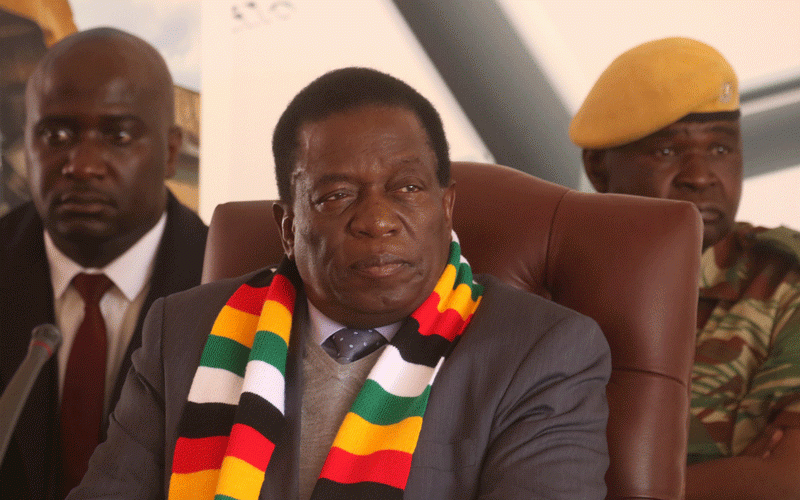
GOOD day, President Emmerson Mnangagwa. Your Excellency, methinks Prosecutor-General Justice Loyce Matanda-Moyo made the right noise for the eradication of corruption given that those who live and breathe corruption flaunt their ill-gotten wealth. Yet, the call to combat graft is now a decadent ritual.
She recently affirmed her commitment to the eradication of corruption within the National Prosecuting Authority of Zimbabwe and the Justice system as a whole, notwithstanding that these institutions must be constitutively incorruptible.
Noble as her commitment might be, Justice Matanda-Moyo needs to be chary. She must take her courage in both hands, wary of the counsel by Voltaire, “It is dangerous to be right in matters were established men are wrong”.
Your Excellency, her recommendation for the creation of a strong anti-corruption ecosystem in Zimbabwe by bringing on board all stakeholders to be part of the fight against corruption is patriotic. Yet, methinks the resolve to eradicate graft is now a faded rallying cry.
From where I stand, the occupational hazards that Geoffrey Nyarota and Davison Maruziva encountered after they exposed the high office vehicle acquisition scandal in 1987 is an apt reminder of the danger Voltire forewarned about. They were condemned instead of commended.
Ironically, President Robert Mugabe led the onslaught against the journalists. He removed them from their editorship roles, accusing them of overzealousness in exposing the corruption. He sympathised with the dishonourable five ministers and a provincial governor who resigned following their convictions. Thereafter, calls to eradicate corruption slid into decadence.
Your Excellency, you rendered your support, as did the Jews to the crucifixion of Jesus, to the removal of the duo from their news desks. You declared, “Criticism is welcome, but, to the extent that the Press now deliberately targets government as their enemy, we then part ways”.
This historic narrative is imperative as Justice Matanda-Moyo braces for her righteous commitment to eradicating corruption. My sixth sense has it that she wants to avoid the consequences of moral neutrality Dante Aĺighieri warned against, “The hottest places in hell are reserved for those who, in times of great moral crisis, maintain their neutrality.”
- Mr President, you missed the opportunity to be the veritable voice of conscience
- ED to commission new-look border post
- Zanu PF ready for congress
- EU slams Zim over delayed reforms
Keep Reading
Your Excellency, it is a moral crisis that Zanu PF bigwigs who were convicted on corruption charges by the 1988 three-men panel commission of enquiry, for the Willowgate scandal, chaired by the late Justice Wilson Sandura are current holders of key government positions.
It is an affront to citizenry which sweats for decent and honest livelihoods that they have the audacity to exude gracious motions and honourable deportment, true to Jonathan Swift's remark, “His motions are graceful and his deportment gracious.” Yet, they are compromised.
It is an irony of fighting corruption that key positions of Speaker of Parliament and Foreign Affairs and International Trade minister in the said new dispensation, are held by tainted cadres.
Their appointments confirm that the fight against corruption is much ado about nothing pretension. Apparently, Nigel Chanakira, in his response to the harmonised elections results, mentioned corruption among other virulent drawbacks to investment that ought be addressed.
Aliko Dangote, Africa's acclaimed entrepreneur, could not tolerate corruption. He hit the ground running from a government riddled with moral laxities. Despite the chant, “Zimbabwe is open for business,” scrupulous investors continue to shun the country due to corruption notoriety.
Ever since the corruption charges against two Zanu PF bigwigs were discharged by the High Court on the grounds of a highly unlikely elementary professional misconduct by the prosecution that it had not told the accused of the charges they were facing. I was duly convinced that the said onslaught against corruption is a much ado about nothing ritual.
It was my fervent expectation that the prosecutor who went to court without furnishing them with the specific allegations they were facing deserved to be summarily dismissed. Yet, there was no news of the reprimand the authorities meted out in view of the glaring abrogation of professional conduct by the said prosecutor.
Methinks it was not an issue of incompetence, but of corruption on the part of the prosecution that two high profile accused persons walked away free without being put to their defence.
As you extended by six months in March last year an inquiry into corruption allegations against a former Zimbabwe Anti-Corruption Commission commissioner, my expectations of a logical legal processes being followed diminished. It was likewise lukewarm in the case of a minister who was alleged to have helped herself to funds at the National Social Security Authority.
Your Excellency, the current report by a global coalition against corruption that Zimbabwe has continued to perform dismally in fighting corruption did not surprise me at all. According to Transparency International's corruption perception index (CPI), Zimbabwe slid further, as it was ranked 149 out of 180 countries.
Some of the variables the CPI takes into account in measuring are bribery, use of public office for private gain, State capture and prosecution of corrupt officials. Yet, one can be forgiven for concluding that these variables, which are conspicuous by their prevalence, are institutionalised in Zimbabwe.
Speaking at the launch of the CPI in January, Transparency International Zimbabwe executive director Tafadzwa Chikumbu attributed the presence of strong rule of law, well-functional democratic institutions and political stability in countries that were ranked high on the index.
He implored Zimbabwe to strengthen the independence of the justice delivery system by promotion of a merit based culture, rather than political appointments, thereby ensuring that the system has qualified personnel and is properly resourced. Corruption corrodes ideals of equitable society.
Verily, compromised bigwigs ought not be in government. Kudos to Madam Matanda-Moyo for the right noise to the eradication of corruption.







